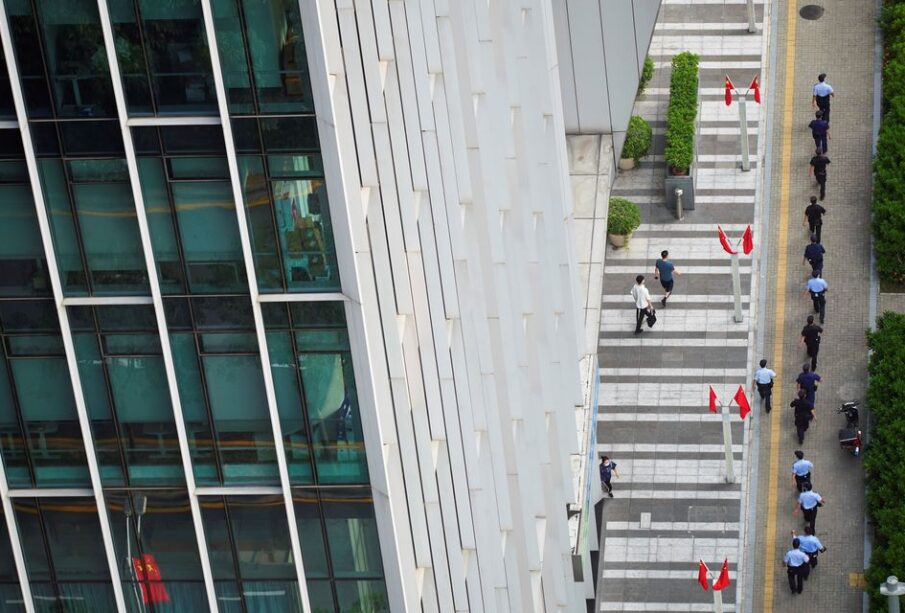China property sector default woes deepen amid Evergrande uncertainty
 Police officers and security personnel walk outside the headquarters of China Evergrande Group in Shenzhen, Guangdong province, China, September 30, 2021. REUTERS/Aly Song
Police officers and security personnel walk outside the headquarters of China Evergrande Group in Shenzhen, Guangdong province, China, September 30, 2021. REUTERS/Aly SongWorries about rising debt defaults by Chinese property developers sapped investor sentiment on Tuesday amid fresh credit rating downgrades and uncertainty about the fate of China Evergrande Group as it scrambles to raise cash by selling assets.
Evergrande is facing one of the country’s largest-ever defaults as it wrestles with more than $300 billion of debt. The company last month missed making coupon payments on two dollar bond tranches.
The possible collapse of one of China’s biggest borrowers has triggered worries about contagion risks to the property sector in the world’s second-largest economy, as its debt-laden peers are hit with rating downgrades on looming defaults.
Evergrande on Monday requested a halt in the trading of its shares pending an announcement about a major deal. Evergrande Property Services Group also requested a halt referring to “a possible general offer” for company shares.
China’s state-backed Global Times said Hopson Development was the buyer of a 51% stake in the property business for more than HK$40 billion ($5.1 billion), citing unspecified other media reports.
Evergrande declined to comment ahead of an official announcement, as trading in the company’s shares remained suspended on Tuesday.
While investors awaited confirmation of the Evergrande stake divestment, Chinese developer Sinic Holdings became the latest to be downgraded by Fitch Ratings on uncertainty over the repayment of its $246 million bonds maturing Oct 18.
Sinic’s long-term issuer default rating was cut to ‘C’ from ‘CCC’, and came after the company announced that certain subsidiaries have missed interest payments on onshore financing arrangements, Fitch said in its report on Tuesday.
S&P Global Ratings also lowered its rating on the company, saying it had run into “severe liquidity problem and its debt-servicing ability has almost been depleted”. It said the company was likely to default on its notes due on Oct. 18.
Sinic declined to comment on the ratings downgrades.
“Since the Evergrande crisis, investors have become more worried and focused about Chinese developer’s repayment ability,” Thomas Kwok, head of equity business at Hong Kong brokerage CHIEF Securities.
The liquidity issues have increased as many developers were not able to issue fresh debt to refinance, and as their ability to raise cash from selling properties dropped because of new regulations, he said.
“This will be a vicious cycle for the developers that are not strong enough, because there is not enough liquidity in the market for everyone.”
MARKET IMPACT
The $5 billion Evergrande is likely to get from the reported unit stake sale would theoretically cover its near-term offshore bond payments. It has $500 million in bond coupons due by year-end, followed by a $2-billion dollar bond maturity in March.
Analysts have said the potential Evergrande deal signals the company was still working to meet its obligations. But any fire-sale of its assets would further amplify concerns about the rest of China’s property sector and the broader economy.
Chinese homebuilder Fantasia Holdings’ dollar-denominated bonds lost nearly half their market value in a massive Monday selloff, after it said it had failed to make a $206 million international market debt payment on time.
In a statement, the property developer said it will assess the potential impact of the non-payment on the group’s financial conditions.
An index of China high-yield debt, which is dominated by developer issuers, hit its lowest since the pandemic drawdown in 2020, and has lost almost 20% since May – while comparable U.S. and European indexes have rallied.
Asian markets fell for a third straight session on Thursday as Evergrande’s troubles added to broader investor worries about rising inflation and slowing world growth, while in Hong Kong the company’s developer peers were under renewed pressure.
An index tracking Hong Kong-listed mainland property stocks fell 2.95% on Tuesday, compared to a 0.3% gain in the local benchmark. Shares in Guangzhou R&F Properties and Sunac China Holdings each fell 8% while the offshore yuan was also under pressure. Shares in Evergrande’s electric vehicle unit eased after jumping on Monday.
Evergrande’s dollar bonds have firmed marginally over recent days, but remain at distressed levels below 30 cents on the dollar.
SOURCE: REUTERS











